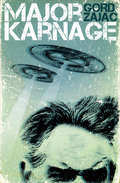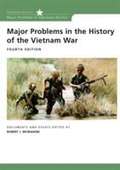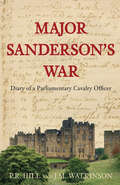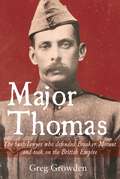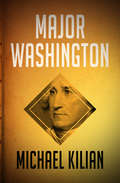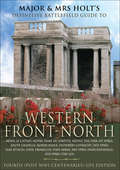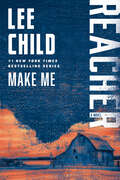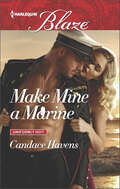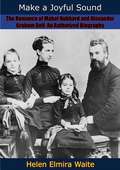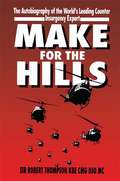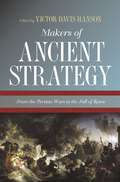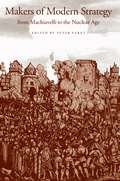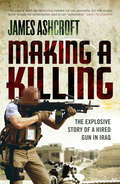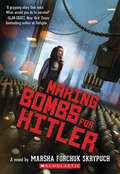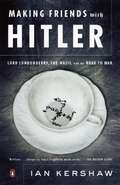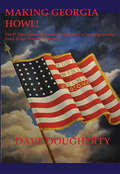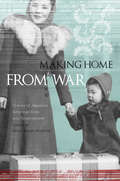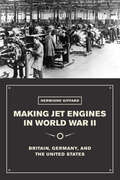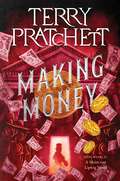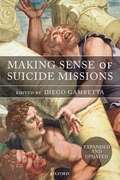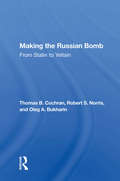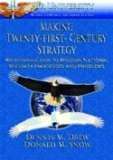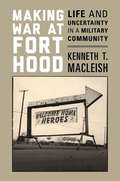- Table View
- List View
Major Karnage
by Gord Zajac“A cross between a contemporary social satire and a send-up of classic sci-fi serials . . . A great, sit-your-ass-down-and-lose-your-mind kind of a read” (Backlisted). DON’T TALK TO HIM ABOUT THE WAR!!!! It has been twenty years since the war, and Maj. John Karnage has finally settled into retirement: locked up in an insane asylum, with an explosive device embedded in the back of his neck to curb his violent tendencies. Karnage and his troopers have been deemed unfit to live in normal society. Like a bit of old chewing gum stuck under a coffee table, the world has left the war and its scarred, unstable veterans behind. The military has been disbanded and world peace has descended upon the Earth. Its inhabitants live happy, profitable lives under the global rule of the benevolent Dabney Corporation. All is tea and roses in this new, sanitized world. Until a terrifying threat from beyond the stars rears its squiggly head! An invading armada of aliens threatens to destroy the Earth, and it’s up to Major Karnage to stop them, as long as he doesn’t accidentally blow his own head off first. “Author Gord Zajac spins an increasingly surreal and hilarious satire of corporatism, government, and the military from this B movie premise for his debut novel.” —Torontoist “Glorious b-movie-worth sci-fi ridiculousness, a non-stop chase through a landscape limited only by Zajac’s imagination.” —Shelf Monkey
Major Problems in the History of the Vietnam War: Documents and Essays (4th edition)
by Robert J. McmahonDesigned to encourage critical thinking about history, the Major Problems in American History series introduces students to both primary sources and analytical essays on important topics in U. S. history. Major Problems in the History of the Vietnam War incorporates new research expands its coverage of the experiences of average soldiers.
Major Sanderson's War: Diary of a Parliamentary Cavalry Officer
by P R Hill J M WatkinsonIn 1919 the diary of a parliamentary cavalry officer, written on an interleaved copy of William Lilly's Merlini Anglici Ephemeris, was exhibited at the Society of Antiquaries of Newcastle upon Tyne. It was discovered to be that of Major John Sanderson for the year 1648, an officer in Colonel Robert Lilburne's regiment of horse. This was an extremely rare find, as while Civil War memoirs were common, daily accounts were not. Spanning from 11th January to 30th December, Sanderson's diary contained 270 entries that not only recalled well-known events, but also depicted the minutiae of patrol and skirmish. Major Sanderson's War is not merely a transcript of the diary, but an analysis of the role of cavalry and the northern campaign of the Second Civil War. No other book will provide the enthusiast with such a unique glimpse into the life of one of Cromwell's officers.
Major Thomas
by Greg GrowdenOpinion is still sharply divided on whether Breaker Morant and his Australian co-defendants were criminals who got what they deserved, or scapegoats used by the British Empire. Major Thomas, the bush lawyer drafted in at the last minute to defend them, is invariably depicted as either a hero or an incompetent fool. Now, for the first time, Greg Growden attempts to unravel the truth about the lawyer and soldier who returned from South Africa a broken man.Before the Boer War, Major Thomas had been a pillar of his community. He was a published poet, newspaper proprietor, lawyer and decorated soldier, but defending Breaker Morant became the defining episode of his life. The former 'King of Tenterfield' endured a stunning fall from grace, slipping into bankruptcy and imprisonment. Thomas ended his days as an eccentric recluse, his life ruined by the ignominy and frustration of finding himself on the wrong side of history.For more than a century he has been a footnote in diverging historical arguments. A proper hearing for Major Thomas is long overdue.
Major Washington
by Michael KilianDecades before the American Revolution, George Washington sparked a war that would change the world On May 28, 1754, the colonial militia surrounded a party of French-Canadian soldiers. With 15 minutes of rifle fire, the colonists slaughtered the French, then allowed Indian guides to take the corpses’ scalps. Observing this grisly scene was a towering young major named George Washington. In the aftermath of the Battle of Jumonville Glen, Washington retreated to Fort Necessity, where he was soon forced to surrender, signing a document claiming responsibility for the assassination of French troops. The result would be the Seven Years’ War—the greatest international conflict the globe had ever seen. It would also be the making of a statesman. In this rousing historical novel, Michael Kilian reconstructs the events in Washington’s life that led to that pivotal day at Jumonville Glen and molded the man who would create a country.
Major and Mrs. Front's Definitive Battlefield Guide to Western Front-North: 100th Anniversary Edition (Major And Mrs Holt's Battlefield Guides)
by Tonie Holt Valmai HoltFollowing in their best-selling series of Battlefield Guides this is a companion volume to the Holts Western Front South Guide. Between the two, they cover the main WW1 Western Front battlefields. This book covers 15 of the most significant battles of the northern area from Nieuwport to just north of The Somme.Whether travelling on the ground or in the mind, the reader is carefully guided through the battlefields with a mixture of succinct military history, cameo memories and stories of VCs and other personalities, interspersed with references to the literature and poetry of the war.This guidebook is based on Tonie and Valmai Holt's 30 years experience of researching, guiding tours and writing about the area, with their unique blend of male and female points of view. It is written to the high standards that have come to be expected of these highly respected authors who are credited with pioneering the modern battlefield tour and whose guide books are referred to as 'The Bibles' . This new edition contains: Brief Historical Background and Summary of each battle, Opening Moves and What Happened, with appropriate quotations Sketch Map for each battle showing battle lines, routes etc and all points of interest described on each timed itinerary Large Sketch Map putting the battlefields (north and south) into perspective Memorials, Museums, Sites of Interest (bunkers, craters etc) War Grave Cemeteries Allied and German GPS Location for every recommended stop War Graves and Commemorative Associations Cameos about individual personalities Useful Tourist Information Where to stay and eat
Make Me: A Jack Reacher Novel (Jack Reacher #20)
by Lee Child#1 NEW YORK TIMES BESTSELLER • Don&’t miss the hit streaming series Reacher! ONE OF THE BEST BOOKS OF THE YEAR: Los Angeles Times, The Guardian, Suspense magazine • Stephen King calls Jack Reacher &“the coolest continuing series character&”—and now he&’s back in this masterly new thriller from Lee Child. &“Why is this town called Mother&’s Rest?&” That&’s all Reacher wants to know. But no one will tell him. It&’s a tiny place hidden in a thousand square miles of wheat fields, with a railroad stop, and sullen and watchful people, and a worried woman named Michelle Chang, who mistakes him for someone else: her missing partner in a private investigation she thinks must have started small and then turned lethal. Reacher has no particular place to go, and all the time in the world to get there, and there&’s something about Chang . . . so he teams up with her and starts to ask around. He thinks: How bad can this thing be? But before long he&’s plunged into a desperate race through LA, Chicago, Phoenix, and San Francisco, and through the hidden parts of the internet, up against thugs and assassins every step of the way—right back to where he started, in Mother&’s Rest, where he must confront the worst nightmare he could imagine. Walking away would have been easier. But as always, Reacher&’s rule is: If you want me to stop, you&’re going to have to make me.
Make Mine a Marine (Uniformly Hot!)
by Candace HavensSubject: Lieutenant Colonel Matt Ryan Mission: Keep things professional...no matter how hard-or hot-it gets! Matt Ryan wants to settle down to a peaceful life as a helicopter instructor at the local base. When he meets free-spirited antiques dealer Chelly Richardson and finds out she's homeless, well, he has to help. But her living in his pool house means the wild-at-heart woman who is stealing his dreams each night is just a bit too close... Chelly is determined to pay back the man who helped her during one of the toughest points in her life. She will also save the straitlaced Marine from the disaster that is her by keeping her hands off his hot, hot body. But the more she tries to stay away, the more fate seems to shove them together.
Make a Joyful Sound: The Romance of Mabel Hubbard and Alexander Graham Bell: An Authorized Biography
by Helen Elmira WaiteThe personal factors behind the great inventions and discoveries that change the world are often overlooked, to history’s loss, and nowhere has this been more true than in the case of Alexander Graham Bell, inventor, experimenter in genetics and aerodynamics, great-hearted friend and teacher of the handicapped. Without his wife’s part in it, his story is only half told.At first the couple seemed a rather unlikely match. Grown to a charming, self-assured maturity after a childhood illness that had robbed her of her hearing, lively Mabel Gardiner Hubbard of Brattle Street, Boston, was not initially impressed with the gangling, dark-haired Scotsman who taught her “Visible Speech.” For Alexander Graham Bell, born of an elocutionist father and extraordinarily gifted with musical ability, falling in love with this petal-checked student of fifteen who was totally deaf was a strange emotional climax to a life devoted to the study, production and enjoyment of sound. But the sheltered girl who could not share with him the pleasure of hearing was not only a delightful, socially talented person, but alert in business matters; and the poor young teacher with a mind unadapted to everyday affairs was destined to become, with her help and encouragement, a brilliant inventor whose best-known product would soon encompass the world almost as effectively as did his own warm and generous heart….Helen Elmira Waite’s intimate study of the lovable, many-sided genius, his family life, his imaginative work and the remarkable woman who stood beside him is based upon official records (some of which are reproduced here), upon the reminiscences of the Bell children and friends, and upon family correspondence never before made available to a biographer.Illustrated with rare photographs.
Make for the Hills: The Autobiography of the World's Leading Counter Insurgency Expert
by Sir Robert ThompsonWhen Robert Thompson left Cambridge to join the Malayan Civil Service in 1938 the sun still shone on the British Empire for 24 hours a day. The outbreak of war in the Pacific found him in Hong Kong from which he was obliged to make a hurried and dramatic exit. From that point most of his working life was spent in military and political circles as one of the world's leading experts on counterinsurgency measures, on which subject he has written a number of highly regarded works. Now, with wit and modesty, he tells the story of his own eventful life, After the war, during which he served in both operations in Burma, he returned to Malaya and it was there, during the Emergency, that he gained the experience in anti-terrorist operations which was eventually to lead him, as special adviser, to Vietnam and on to Washington. En route he was privileged to meet many of the most influential and controversial figures of his time from Wingate and Templer to Kennedy, Nixon and Kissinger. His comments on these and many others, are candid and revealing. Make for the Hills is both a fascinating autobiography and an important addition to the history of the post-war world, especially that of South-East Asia.
Makers of Ancient Strategy: From the Persian Wars to the Fall of Rome
by Victor Davis HansonTimeless lessons from the military strategies of the ancient Greeks and RomansIn this prequel to the now-classic Makers of Modern Strategy, Victor Davis Hanson, a leading scholar of ancient military history, gathers prominent thinkers to explore key facets of warfare, strategy, and foreign policy in the Greco-Roman world. From the Persian Wars to the final defense of the Roman Empire, Makers of Ancient Strategy demonstrates that the military thinking and policies of the ancient Greeks and Romans remain surprisingly relevant for understanding conflict in the modern world.The book reveals that much of the organized violence witnessed today—such as counterterrorism, urban fighting, insurgencies, preemptive war, and ethnic cleansing—has ample precedent in the classical era. The book examines the preemption and unilateralism used to instill democracy during Epaminondas's great invasion of the Peloponnesus in 369 BC, as well as the counterinsurgency and terrorism that characterized Rome's battles with insurgents such as Spartacus, Mithridates, and the Cilician pirates. The collection looks at the urban warfare that became increasingly common as more battles were fought within city walls, and follows the careful tactical strategies of statesmen as diverse as Pericles, Demosthenes, Alexander, Pyrrhus, Caesar, and Augustus. Makers of Ancient Strategy shows how Greco-Roman history sheds light on wars of every age. In addition to the editor, the contributors are David L. Berkey, Adrian Goldsworthy, Peter J. Heather, Tom Holland, Donald Kagan, John W. I. Lee, Susan Mattern, Barry Strauss, and Ian Worthington.
Makers of Modern Strategy from Machiavelli to the Nuclear Age: from Machiavelli to the Nuclear Age
by Russell F. WeigleyThe classic reference volume on the theory and practice of warThe essays in this volume analyze war, its strategic characterisitics, and its political and social functions over the past five centuries. The diversity of its themes and the broad perspectives applied to them make the book a work of general history as much as a history of the theory and practice of war from the Renaissance to the present. Makers of Modern Strategy from Machiavelli to the Nuclear Age takes the first part of its title from an earlier collection of essays, published by Princeton University Press in 1943, which became a classic of historical scholarship. Three essays are repinted from the earlier book while four others have been extensively revised. The rest—twenty-two essays—are new.The subjects addressed range from major theorists and political and military leaders to impersonal forces. Machiavelli, Clausewitz, and Marx and Engels are discussed, as are Napoleon, Churchill, and Mao. Other essays trace the interaction of theory and experience over generations—the evolution of American strategy, for instance, or the emergence of revolutionary war in the modern world. Still others analyze the strategy of particular conflicts—the First and Second World Wars—or the relationship between technology, policy, and war in the nuclear age. Whatever its theme, each essay places the specifics of military thought and action in their political, social, and economic environment. Together, the contributors have produced a book that reinterprets and illuminates war, one of the most powerful forces in history and one that cannot be controlled in the future without an understanding of its past.
Making A Killing: The Explosive Story of a Hired Gun in Iraq
by James AshcroftIn September 2003, James 'Ash' Ashcroft, a former British Infantry Captain, arrived in Iraq as a 'gun for hire'. It was the beginning of an 18-month journey into blood and chaos.In this action-packed page-turner, Ashcroft reveals the dangers of his adrenalin-fuelled life as a security contractor in Baghdad, where private soldiers outnumber non-US Coalition forces in a war that is slowly being privatised. From blow-by-blow accounts of days under mortar bombardment to revelations about life operating deep within the Iraqi community, Ashcroft shares the real, unsanitised story of the war in Iraq - and its aftermath - direct from the front line.
Making Bombs for Hitler
by Marsha Forchuk SkrypuchLida thought she was safe. Her neighbors wearing the yellow star were all taken away, but Lida is not Jewish. She will be fine, won't she?But she cannot escape the horrors of World War II. Lida's parents are ripped away from her and she is separated from her beloved sister, Larissa. The Nazis take Lida to a brutal work camp, where she and other Ukrainian children are forced into backbreaking labor. Starving and terrified, Lida bonds with her fellow prisoners, but none of them know if they'll live to see tomorrow. When Lida and her friends are assigned to make bombs for the German army, Lida cannot stand the thought of helping the enemy. Then she has an idea. What if she sabotaged the bombs. . . and the Nazis? Can she do so without getting caught?And if she's freed, will she ever find her sister again?This pulse-pounding novel of survival, courage, and hope shows us a lesser-known piece of history -- and is sure to keep readers captivated until the last page.
Making British Defence Policy: Continuity and Change (Routledge Advances in Defence Studies)
by Robert SelfThis book explores the process by which defence policy is made in contemporary Britain and the institutions, actors and conflicting interests which interact in its inception and continuous reformulation. Rather than dealing with the substance of defence policy, this study focuses upon the institutional actors involved in this process. This is a subject which has commanded far more interest from public, Parliament, government and the armed forces since the protracted, bloody and ultimately unsuccessful British military involvement in Iraq and Afghanistan. The work begins with a discussion of two contextual factors shaping policy. The first relates to the impact of Britain’s ‘special relationship’ with the United States over defence and intelligence matters, while the second considers the impact of Britain’s relatively disappointing economic performance upon the funding of British defence since 1945. It then goes on to explore the role and impact of all the key policy actors, from the Prime Minister, Cabinet and core executive, to the Ministry of Defence and its relations with the broader ‘Whitehall village’, and the Foreign Office and Treasury in particular. The work concludes by examining the increasing influence of external policy actors and forces, such as Parliament, the courts, political parties, pressure groups and public opinion. This book will be of much interest to students of British defence policy, security studies, and contemporary military history.
Making Friends with Hitler: Lord Londonderry, the Nazis and the Road to World War II
by Ian KershawCharles Stewart Henry Vane-Tempest-Stewart, the 7th Marquess of Londonderry, was born to power and command. Scion of one of Britain's most aristocratic families, cousin of Churchill and confidant of the king, owner of vast coal fields and landed estates, married to the doyenne of London's social scene, Londonderry was an ornament to his class, the 0. 1 percent of the population who still owned 30 percent of England's wealth as late as 1930. But history has not been kind to "Charley," as the king called him, because, in his own words, he "backed the wrong horse," and a very dark horse indeed: Adolf Hitler and his Nazi Party. Londonderry was hardly the only British aristocrat to do so, but he was the only Cabinet member to do so, and it ruined him. In a final irony, his grand London house was bombed by the German Luftwaffe in the blitz. Ian Kershaw is not out to rehabilitate Lord Londonderry but to understand him and to expose why he was made a scapegoat for views that were much more widely held than anyone now likes to think. H. L. Mencken famously said that "for every complex problem, there is a solution that is simple, neat, and wrong. " The conventional explanation of the coming of World War II is a simple story of the West's craven appeasement of Hitler in the face of his bullying. Through the story of how Lord Londonderry came to be mixed up with the Nazis and how it all went horribly wrong for him, Ian Kershaw shows us that behind the familiar cartoon is a much more complicated and interesting reality, full of miscalculations on both sides, miscalculations that proved to be among the most fateful in history.
Making Georgia Howl!: The 5th Ohio Volunteer Cavalry in Kilpatrick's Campaign & the Diary of Sgt W.H. Harding
by Dave DoughertyThe 5th Ohio Volunteer Cavalry Regiment fought over three years, from March 1862 to General Johnson’s surrender in April 1865. It played a major role in Kilpatrick’s Cavalry Corps on Sherman’s March to the Sea; told as an overview of operations and through the diary of Sergeant William H. Harding. Confederate histories have often reported the regiment decimated and defeated in every battle, but this study presents the truth of the matter for the first time. Fighting in Judson Kilpatrick’s 3rd Cavalry Division during Sherman’s campaign through Georgia and the Carolina’s doing everything that could be expected of them and acquitted themselves honorably against the Confederate commanders – Joseph Wheeler and Wade Hampton. This volume is the definitive study of the 5th Ohio and Kilpatrick’s campaign in Sherman’s army from Atlanta to the end of the war. Bonuses include the diary and letters of Commissary Sergeant William H. Harding present in Company K of the 5th OVC from August 1862 to July 1865.
Making Home From War: Stories of Japanese American Exile and Resettlement
by Brian DempsterMany books have chronicled the experience of Japanese Americans in the early days of World War II, when over 120,000 persons of Japanese ancestry, two-thirds of whom were American citizens, were taken from their homes along the West Coast and imprisoned in concentration camps. When they were finally allowed to leave, a new challenge faced them—how do you resume a life so interrupted? For most, going home meant learning to live in a hostile, racist environment. Some returned to find they had lost their homes and had little choice but to bide their time in transitional housing, including community halls, churches, housing projects, and tent camps. Their employment options were also limited; they often worked as domestics, dishwashers, and field laborers to help support their families. The effects of these experiences reverberate to this day, and Making Home from War reaches into the past, melds together what was once hidden, and tells the often neglected or hushed story of what happened after the war. <P><P>With honesty and an eye for detail, Making Home from War is the long-awaited sequel to the award-winning From Our Side of the Fence. Written by twelve Japanese American elders who gathered regularly at the Japanese Cultural and Community Center of Northern California, Making Home from War is a collection of stories about their exodus from concentration camps into a world that in a few short years had drastically changed. In order to survive, they found the resilience they needed in the form of community, and gathered reserves of strength from family and friends. Through a spectrum of conflicting and rich emotions, Making Home from War demonstrates the depth of human resolve and faith during a time of devastating upheaval.
Making Jet Engines in World War II: Britain, Germany, and the United States
by Hermione GiffardOur stories of industrial innovation tend to focus on individual initiative and breakthroughs. With Making Jet Engines in World War II, Hermione Giffard uses the case of the development of jet engines to offer a different way of understanding technological innovation, revealing the complicated mix of factors that go into any decision to pursue an innovative, and therefore risky technology. Giffard compares the approaches of Britain, Germany, and the United States. Each approached jet engines in different ways because of its own war aims and industrial expertise. Germany, which produced more jet engines than the others, did so largely as replacements for more expensive piston engines. Britain, on the other hand, produced relatively few engines--but, by shifting emphasis to design rather than production, found itself at war's end holding an unrivaled range of designs. The US emphasis on development, meanwhile, built an institutional basis for postwar production. Taken together, Giffard's work makes a powerful case for a more nuanced understanding of technological innovation, one that takes into account the influence of the many organizational factors that play a part in the journey from idea to finished product.
Making Money: A Discworld Novel (Moist von Lipwig #2)
by Terry Pratchett“Outlandish fun. . . . Making Money balances satire, knockabout farce and close observation of human—and non-human—foibles with impressive dexterity and deceptive ease. The result is another ingenious entertainment from the preeminent comic fantasist of our time.”—Washington PostThe hero of Going Postal has an even more dangerous job than the mail: overseeing the tanking Royal Bank and the printing of Ankh-Morpork’s first paper currency in this brilliant installment in New York Times bestselling author Sir Terry Pratchett’s beloved Discworld series.The Royal Bank of Ankh-Morpork is facing a crisis, and who better to manage it than the man who turned around Ankh-Morpork’s inefficient Post Office, former arch-swindler-turned-Postmaster General Moist von Lipwig. Lord Vetinari once again makes Moist an offer he can’t refuse: resuscitate the venerable Royal Mint.The bank has many problems: the chief cashier is almost certainly a vampire, the elderly chairman and her two loaded crossbows needs a daily walkie, there’s something strange happening in the cellar, and running the Royal Mint is costing a mint.As Moist begins to make some ambitious changes, he accrues some dangerous enemies. Everyone knows money is power—and certain stakeholders will do anything to keep a firm grip on both . . .The Discworld novels can be read in any order, but Making Money is the second book in the Moist von Lipwig series. The full series, in order, includes:Going PostalMaking MoneyRaising Steam
Making Sense of Ballistic Missile Defense: An Assessment of Concepts and Systems for U.S. Boost-Phase Missile Defense in Comparison to Other Alternatives
by Committee on an Assessment of Concepts Systems for U.S. Boost-Phase Missile Defense in Comparison to Other AlternativesThe Committee on an Assessment of Concepts and Systems for U. S. Boost-Phase Missile Defense in Comparison to Other Alternatives set forth to provide an assessment of the feasibility, practicality, and affordability of U. S. boost-phase missile defense compared with that of the U. S. non-boost missile defense when countering short-, medium-, and intermediate-range ballistic missile threats from rogue states to deployed forces of the United States and its allies and defending the territory of the United States against limited ballistic missile attack. To provide a context for this analysis of present and proposed U. S. boost-phase and non-boost missile defense concepts and systems, the committee considered the following to be the missions for ballistic missile defense (BMD): protecting of the U. S. homeland against nuclear weapons and other weapons of mass destruction (WMD); or conventional ballistic missile attacks; protection of U. S. forces, including military bases, logistics, command and control facilities, and deployed forces, including military bases, logistics, and command and control facilities. They also considered deployed forces themselves in theaters of operation against ballistic missile attacks armed with WMD or conventional munitions, and protection of U. S. allies, partners, and host nations against ballistic-missile-delivered WMD and conventional weapons. Consistent with U. S. policy and the congressional tasking, the committee conducted its analysis on the basis that it is not a mission of U. S. BMD systems to defend against large-scale deliberate nuclear attacks by Russia or China. Making Sense of Ballistic Missile Defense: An Assessment of Concepts and Systems for U. S. Boost-Phase Missile Defense in Comparison to Other Alternatives suggests that great care should be taken by the U. S. in ensuring that negotiations on space agreements not adversely impact missile defense effectiveness. This report also explains in further detail the findings of the committee, makes recommendations, and sets guidelines for the future of ballistic missile defense research.
Making Sense of Suicide Missions
by Diego GambettaBased on a wealth of original information and research, and containing contributions from internationally distinguished scholars, 'Making Sense of Suicide Missions' furthers our understanding of this chilling feature of the contemporary world in radically new and unexpected ways.
Making The Russian Bomb: From Stalin To Yeltsin
by Thomas B. CochranThe Natural Resources Defense Council once again provides the definitive account of the current status of Russian nuclear weapons. Taking advantage of previously unavailable information the authors describe the origins, growth, and decline of the massive Soviet nuclear weapons production complex-the places involved in the recent headline-making epi
Making Twenty-First-Century Strategy: An Introduction to Modern National Security Processes and Problems
by Donald M. Snow Dennis M. DrewMaking Twenty-first-century Strategy: An Introduction to Modern National Security Processes and Problems
Making War at Fort Hood: Life and Uncertainty in a Military Community
by Kenneth T. MacLeishAn intimate look at war through the lives of soldiers and their families at Fort HoodMaking War at Fort Hood offers an illuminating look at war through the daily lives of the people whose job it is to produce it. Kenneth MacLeish conducted a year of intensive fieldwork among soldiers and their families at and around the US Army's Fort Hood in central Texas. He shows how war's reach extends far beyond the battlefield into military communities where violence is as routine, boring, and normal as it is shocking and traumatic.Fort Hood is one of the largest military installations in the world, and many of the 55,000 personnel based there have served multiple tours in Iraq and Afghanistan. MacLeish provides intimate portraits of Fort Hood's soldiers and those closest to them, drawing on numerous in-depth interviews and diverse ethnographic material. He explores the exceptional position that soldiers occupy in relation to violence--not only trained to fight and kill, but placed deliberately in harm's way and offered up to die. The death and destruction of war happen to soldiers on purpose. MacLeish interweaves gripping narrative with critical theory and anthropological analysis to vividly describe this unique condition of vulnerability. Along the way, he sheds new light on the dynamics of military family life, stereotypes of veterans, what it means for civilians to say "thank you" to soldiers, and other questions about the sometimes ordinary, sometimes agonizing labor of making war.Making War at Fort Hood is the first ethnography to examine the everyday lives of the soldiers, families, and communities who personally bear the burden of America's most recent wars.
